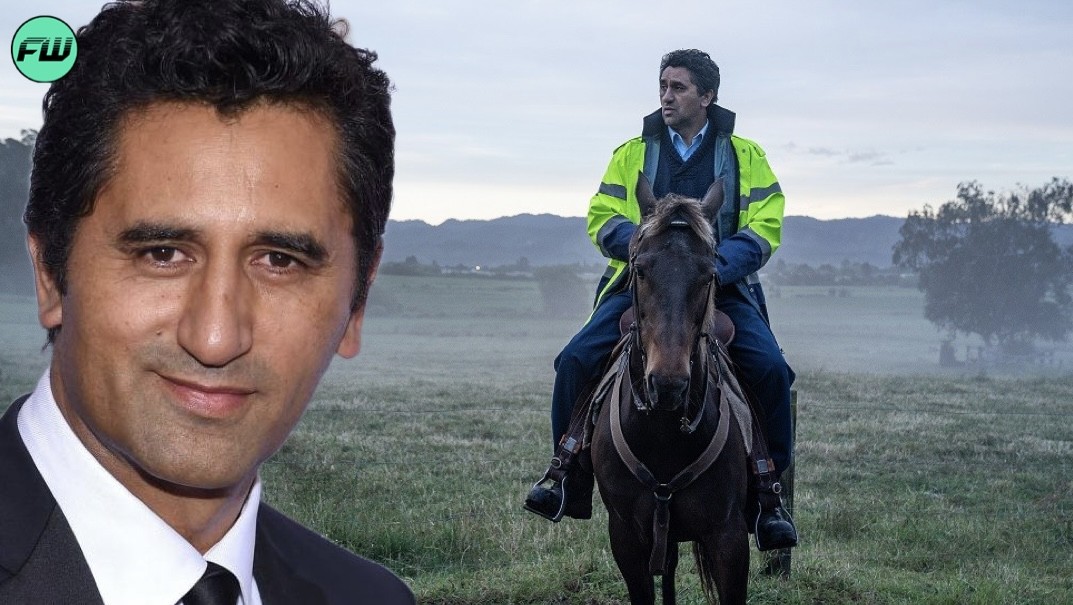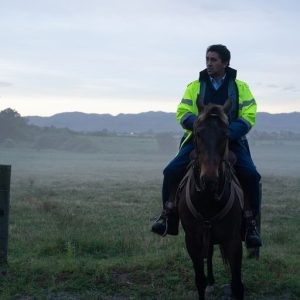The country of New Zealand first submitted a film for consideration in the Best International Film category in 2011, and their most recent submission was in 2018… until now. The Mãori film Muru has been officially selected by New Zealand as their entry into the Oscar race after its International Premiere in the Contemporary World Cinema section at the Toronto International Film Festival.
The title of the film, Muru, is a Māori word that has several different meanings depending on its context. The film, telling the story of a New Zealand Police Sergeant who must choose between his badge and his people, is best defined by the translation of the word as “forgive.” For the film’s star Cliff Curtis (Training Day), this really represents the meaning of the film.
“This is one of my favorite, favorite, favorite topics. That’s all [Tearepa]. He brought the name of the movie as the writer and director, and I absolutely love it. There’s two things about the name. Firstly, there’s the name of the movie, which is in our native language. We don’t tend to take words out of context and throw them out there. That’s a sort of contemporary thing. Grammatically, it would be incorrect for us to select, throw a word out like that, unadorned with context. But you know, that’s a contemporary use of words. That’s my understanding. And then, so often words can be translated in multiple different ways, depending on context. So I translate the word simply as ‘Forgive.’ It can be translated to mean lots of in many different ways, depending on context and what it is you’re trying to convey, but that’s how I translate it. And then when we were doing the film, Tipenhe Ohlson who plays my dad in the film. He basically gave us the phrase that the essence of the movie for him came down to the single phrase, ‘muru o matou hara me matou hara me nei,’ which is ‘forgive us our trespasses as we forgive those who trespass against us.’ That’s been an anchor for me. Why are we telling this story? What do we hope to offer ourselves and others? Why are we going through the past, historical events, and reinventing it in the form of a fictional movie and as cinema? The aspiration, I suppose, comes down to that single line for me.” – Cliff Curtis
One of the most exceptional things about this film is the extraordinary depth with which it represents the Indigenous people of New Zealand. This is a demographic that is not often given the spotlight in films that reach a global scale, but writer/director Tearepa Kahi has made something that is truly special in what it accomplishes.
“Cliff and Tame and I, we have relationships with each other. And why this representation doesn’t happen very often is because sometimes, as it’s depicted on the screener, there are facsimiles of other people’s ideas. We weren’t as connected. But what has been happening recently is the great connection. The only thing that helped us make this film was the relationships that we have and the relationships to our language, to our people, to their families, and also to the way that we do things. There was never a Western question, we never had to incorporate and integrate doing it this way. What you’re seeing is a Māori film, told by Māori, for Māori, with Tūhoe. Because of that relationship there Because of that relationship there, that’s why the spirit of Tūhoe seeps through every frame and articulates, cultivates, and shapes all the relationships within the film.” – Tearepa Kahi
Rather than telling this story in English, Kahi chose to write the film in the language of the Indigenous people of New Zealand, Māori. It was a daring approach because, on paper, that limits the appeal that it could have for international audiences. But for Kahi, it was more important that he got this story right, and the result is a film that feels undeniably authentic.
“The challenge is that, locally speaking, Tūhoe are the best speakers of Māori. So for Māori in New Zealand, and for all of us, there was a lot of training that needed to take place if you weren’t from Tūhoe. We had a lot of people from Tūhoe — Tame Iti, Tipenhe Ohlson, Ria Paki — who are all from the valley, so there’s no issues there. That allowed our other actors, like Cliff, to have beautiful support from so many people from there to hit the mark. If you’re going to shoot a film in Tūhoe, representing Tūhoe, with participation from Tūhoe, to honor Tūhoe, you have to speak the way they speak.” – Tearepa Kahi
“You know, I had to learn my language growing up, and it’s still a process of learning and growing into it. And certainly, I’m lacking in fluency and don’t speak that dialect of our language, which is an hour and fifteen minutes from my house, because it’s a totally different level of the language they speak there. I had to learn it.” – Cliff Curtis
The protagonist that Curtis plays in the film is very complex, his arc being one of internal conflict. Curtis’s character must choose between his allegiance to the police force to whom he has taken an oath and the people he knows and loves in his community. What he goes through is a genuine dilemma, and Curtis was the perfect actor to pull off this complex role.
“I think the challenge is that it’s really about the idea of masculinity and being caught between two sets of values. On one side, he’s chosen a vocation: to be a police officer within his community and to be of service to his community as a police officer. He’s a man of the law and takes his badge as his identity. He belongs to the Crown being a part of the police forces. But in this instance, the crown is asking him to profile his own people as terrorists. He has to make this impossible choice. How does a good man choose his life’s work over his family? Does he choose his government and his Crown and his institution that he believes in even though they’re up against his own people? How does a good man not make a mistake under those circumstances? How do you be a good human being?” – Cliff Curtis
“Testing loyalty is a big challenge for a lot of Indigenous people who have undertaken responsibilities that the government has imposed, that the community requires. Creating that character to not only have that complexity, but to drive that wedge was really important and something that wasn’t just done by the writer but that [Cliff and I] crafted together.” – Tearepa Kahi
“And the reward, I credit Tearepa. He could have chosen any character in that valley to be the pivotal character around these circumstances. It could have been the SDG officer, it could have been this young boy, it could have been the other constable, but Tearepa chose this character. I remember really distinctly when he said, ‘This is the person that has the greatest arc and the greatest conflict in terms of being true to themselves and trying to maintain the line,’ and I thought that was very astute. That’s all Tearepa, and the reward was to work with him and to see everybody’s work to ground and convey the humanity of it, and to create a narrative around positive masculinity and trying to be an honorable human being.” – Cliff Curtis
Also Read: Bros TIFF Review: A Hilarious, Intelligent LGBGTQ Romantic Comedy
While the film deals with this complex subject matter and weighty themes, it is still an exciting action thriller. Audiences will be on the edge of their seats in anticipation, which only accentuates the emotional power of the storyline. Viewers will leave the film feeling both entertained and provoked by what they have seen.
“Thank you for framing it that way.” – Cliff Curtis
“Yeah, thank you. There’s definitely so many pitfalls and so many tropes and trodden paths. Everything I do that requires my time, that I invest my family’s time in since my wife is the producer, and we have four kids who grew up speaking Māori, I make it for them. I made it for my whānau [the Māori word for family], as well as for Tami’s whānau and Cliff’s whānau. What tends to happen back home is that a Māori story ends up with so much guilt, and then it goes into this space of black and white. Everybody travels these simple lines of black is bad, white is good, or vice versa. So we had to straddle the line between entertainment and depth in depicting the valley and these beautiful, tender relationships. It was a very heavy topic, but in anything like that, there’s always opportunity for artistry, cinema, and forming a deeper understanding. It’s a great rollercoaster ride.” – Tearepa Kahi
For both Kahi and Curtis, Muru was a passion project brought to life, and it shows in the final product. Its combination of a weighty storyline with entertaining action beats is sure to win over audiences and leave them feeling moved. Hopefully, this will translate into love from the Academy during Oscars voting.
Follow us for more entertainment coverage on Facebook, Twitter, Instagram, and YouTube.


